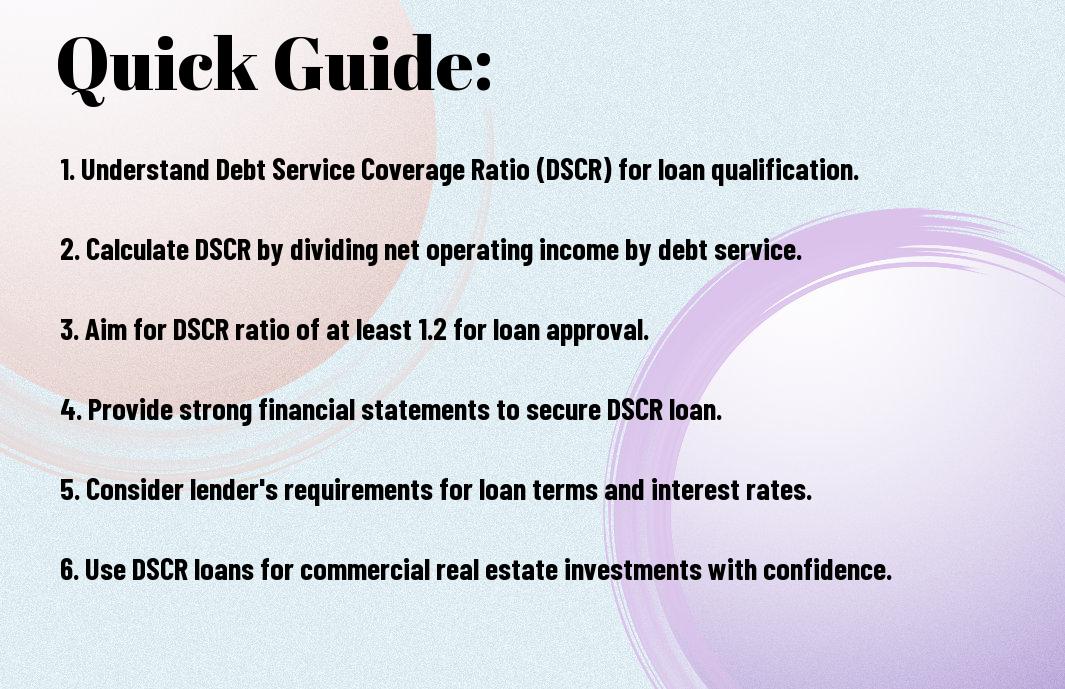Many real estate investors rely on financing to grow their portfolios, and one crucial tool in their arsenal is the Debt Service Coverage Ratio (DSCR) loan. Understanding how DSCR loans work is necessary for investors looking to leverage their assets effectively. This comprehensive guide will research into the key benefits of DSCR loans, the potential risks involved, and everything in between to empower investors with the knowledge needed to make informed financial decisions.
Key Takeaways:
- DSCR Loans are based on property income: Debt-Service Coverage Ratio (DSCR) loans rely on the property’s income to qualify for financing, not the borrower’s personal income.
- Focus on property’s cash flow: Lenders assess the property’s ability to generate enough income to cover the loan payments, looking at the DSCR to ensure viability.
- Higher DSCR, better loan terms: A higher DSCR ratio indicates a more liquid property with stronger cash flow, leading to more favorable loan terms and interest rates.

Types of DSCR Loans
Assuming you’re a real estate investor looking to finance a property, understanding the different types of DSCR loans available in the market is crucial. Here, we will discuss the various options to help you make an informed decision based on your financial goals and investment strategy.
| Loan Type | Description |
| Traditional DSCR Loans | Standard loans requiring income verification |
| No-Income Verification DSCR Loans | Loans without the need for income documentation |
| Refinance DSCR Loans | Loan options for refinancing existing properties |
Traditional DSCR Loans
Some investors prefer traditional DSCR loans that require thorough income verification to ensure repayment capacity. These loans typically offer lower interest rates but come with stricter qualification criteria to mitigate the lender’s risk.
No-Income Verification DSCR Loans
Clearly, no-income verification DSCR loans provide flexibility for investors who may have unconventional income sources or limited documentation. While these loans offer quick approval processes, they often come with higher interest rates to compensate for the increased risk to the lender. It is important to consider the trade-offs carefully before opting for this type of loan.
Another aspect to note about no-income verification DSCR loans is that they are popular among self-employed individuals or those with irregular income streams. These loans can be a viable option for investors looking to expedite the financing process without extensive paperwork requirements.
Refinance DSCR Loans
Loans designed for refinancing properties, refinance DSCR loans allow investors to adjust their debt-to-income ratios and potentially secure better loan terms. These loans can help investors capitalize on improved property values or take advantage of lower interest rates in the market.
Factors Affecting DSCR Loan Approval
To secure a DSCR loan successfully, real estate investors must meet specific criteria. Understanding the factors that influence DSCR loan approval is crucial to navigating the application process effectively. Below are key elements to consider:
- Credit Score Requirements
- Property Cash Flow Analysis
- Debt Service Coverage Ratio Calculation
Credit Score Requirements
Score plays a vital role in determining eligibility for a DSCR loan. Lenders typically seek a credit score of 680 or higher for approval. A higher credit score indicates a lower lending risk and improves the chances of obtaining favorable loan terms. Maintaining a healthy credit profile is necessary for securing financing for real estate investments efficiently. For more information on what credit score is needed for a DSCR loan, check out this What is a DSCR loan? A complete guide.
Property Cash Flow Analysis
To gain approval for a DSCR loan, lenders assess the property’s cash flow potential. They analyze rental income, operating expenses, and vacancy rates to determine if the property generates enough revenue to cover mortgage payments. Providing accurate and detailed cash flow projections can strengthen the loan application and demonstrate the property’s investment value. Another crucial aspect is to show a consistent history of positive cash flow to assure lenders of the property’s income-generating potential.
Debt Service Coverage Ratio Calculation
When applying for a DSCR loan, lenders calculate the loan‘s debt service coverage ratio (DSCR) to evaluate the property’s ability to generate enough income to cover debt obligations. A DSCR of 1.25 or higher is typically required for loan approval, indicating that the property generates 1.25 times the income needed to repay the debt. Maintaining a healthy DSCR ratio is key to securing favorable loan terms and demonstrating financial stability to lenders.
Step-by-Step Guide to Obtaining a DSCR Loan
Preparation and Documentation
An important first step in securing a DSCR loan is to gather all necessary documentation. Lenders will typically require financial statements, tax returns, credit reports, and property information. It is crucial to have all paperwork organized and up-to-date to expedite the loan approval process.
Application Process
Process of applying for a DSCR loan involves submitting the necessary paperwork to the lender for review. This includes providing details on the property’s income, expenses, and overall financial performance. Lenders will carefully assess the Debt Service Coverage Ratio (DSCR) to determine the property’s ability to generate sufficient income to cover the loan payments.
Tips for Prospective Borrowers
Despite the complexities of DSCR loans, there are several tips that prospective borrowers can follow to increase their chances of securing favorable terms and conditions.
- Research multiple lenders to find the best rates and terms for your specific needs.
- Prepare a solid business plan and financial statements to demonstrate your ability to repay the loan.
- Maintain a good credit score to improve your chances of approval and better terms.
- Consider working with a financial advisor or real estate expert to navigate the loan process successfully.
After following these tips, prospective borrowers will be better positioned to secure a DSCR loan that meets their needs.
Improving Your Loan Terms
Clearly, one of the most effective ways to improve your loan terms for a DSCR loan is to strengthen your financial profile. Lenders will look favorably upon borrowers with a high debt service coverage ratio (DSCR), good credit history, and a solid business plan. By demonstrating your ability to generate sufficient income to cover the loan payments comfortably, you can negotiate for better interest rates and loan terms.
Negotiating with Lenders
With negotiating with lenders for a DSCR loan, it is important to approach the process strategically. It is crucial to highlight your strengths as a borrower, such as a stable income, healthy DSCR ratio, and a solid credit history. By showcasing these positive attributes, you can leverage them to negotiate for lower interest rates, longer repayment terms, or other favorable conditions. It may also be beneficial to compare offers from multiple lenders to ensure you are getting the best possible deal.
Pros and Cons of DSCR Loans
| Pros | Cons |
| Lower Interest Rates | Higher Qualification Standards |
| Longer Repayment Terms | Slow Approval Process |
| Increased Borrowing Capacity | Strict Property Valuation Requirements |
Advantages for Real Estate Investors
Considering DSCR loans can be beneficial for real estate investors due to the lower interest rates compared to other financing options. Additionally, longer repayment terms can help in managing cash flow for properties, especially during periods of vacancy or market fluctuations.
Potential Drawbacks
If you are considering DSCR loans, it is imperative to be aware of potential drawbacks. The strict qualification standards and property valuation requirements may make it challenging for some investors to qualify for these loans. Additionally, the slow approval process can delay funding, impacting investment timelines.
The key to successfully navigating DSCR loans is to carefully weigh the pros and cons to determine if this financing option aligns with your investment goals and financial capabilities. Conduct thorough research and consider consulting with financial advisors to make informed decisions regarding DSCR loans.
Summing up
Presently, you have gained a comprehensive understanding of DSCR loans and how they can benefit real estate investors. By learning about Debt Service Coverage Ratios, loan structuring, and eligibility requirements, you are better equipped to navigate the world of commercial real estate financing. Remember to analyze your investment goals and financial situation carefully before pursuing a DSCR loan to ensure it aligns with your long-term objectives. With this guide, you are now ready to take the next step in your real estate investment journey with confidence and clarity.
FAQ
Q: What are DSCR loans?
A: DSCR stands for Debt Service Coverage Ratio loans. These are loans commonly used by real estate investors to finance properties. Lenders use the DSCR to evaluate the property’s ability to generate enough income to cover the loan payments.
Q: How is Debt Service Coverage Ratio (DSCR) calculated?
A: DSCR is calculated by dividing the property’s net operating income (NOI) by the annual debt service (loan payments). The formula for DSCR is: DSCR = Net Operating Income / Annual Debt Service. A DSCR ratio of 1.25 or higher is generally preferred by lenders.
Q: What are the benefits of using DSCR loans for real estate investing?
A: DSCR loans offer real estate investors several benefits, including lower interest rates, longer loan terms, and higher loan amounts. By using DSCR loans, investors can leverage their properties to maximize cash flow and grow their real estate portfolios.

